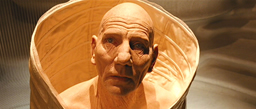Æon Flux
The Ethics of Cloning
Pete Postlethwaite as the Keeper
Cloning is an important scientific concept central to the plot of the 2005 film Æon Flux. As such, discussion of the film provides us with an opportunity to discuss cloning within the context of ethics.
In the world of Æon Flux, a virus breaks out in 2011. Trevor Goodchild creates a cure, but this cure has the inadvertent effect of causing everyone to become infertile. Thus, Goodchild and a few others agree to start secretly cloning everyone in order to keep humanity from becoming extinct.
Cloning is thus used in the film for a noble purpose, and with primarily positive results. Humanity indeed continues to survive, and the story opens four hundred years into the future. Goodchild, and his subsequent clones, has continued all this time to search for a cure to the infertility, with the hope that, someday, human survival will not depend upon cloning.
Unbeknownst to Trevor Goodchild, however, is the fact that the infertility is no longer a threat to human survival. As it turns out, Trevor’s brother, Oren Goodchild, has been using the secret police to murder those who become pregnant. Oren Goodchild likes the power he holds, and believes the best way to sustain said power is to keep his own brother in the dark about the fertility of various individuals.
According to the authors of Human Cloning in the Media: From Science Fiction to Science Practice, “The potential utility of reproductive cloning is figured positively in Aeon Flux.”1 And they are correct—it is reproductive human cloning that keeps humanity alive. Certainly, salvation from extinction has its benefits. “Nevertheless,” they add, “even in this film which provides the most optimistic reproductive cloning filmic scenario to date (outside of comedy), the biotechnology is ultimately rejected, in favour of a ‘return to nature’.”2
As the authors explain on page sixty-three, Æon Flux
represents human reproductive cloning as providing a solution to a global pandemic which threatens to wipe out human life. In this film, cloning is a short-term solution, providing temporal relief from the threat of extinction, but one which must ultimately be rejected with the return to ‘nature’ at the end of the narrative. Resonant with Jurassic Park (1997), which ends with the claim that ‘life finds a way’, Aeon Flux finishes with one of the protagonists declaring that ‘nature finds a way’. Hence, Aeon Flux concludes with a rejection of cloning on the grounds that it is unnatural. … Although it explores the promise of technology (specifically cloning), its resolution of this dilemma is, in effect, to advocate a return to nature (through the rejection of cloning).3
While these authors are correct to note the relatively positive portrayal of cloning as a useful tool for humanity, they are nevertheless entirely off base when they claim that the film ultimately rejects cloning. It’s not that cloning is rejected, but rather that infringements upon freedom of choice is rejected.
Amelia Warner as Una Flux
To be more precise, the cloning depicted in Æon Flux is not the problem against which the protagonists struggle. Rather, they struggle against the oppressive system which has hitherto secretly forced women to unknowingly accept cloned embryos in their wombs, and which has also committed murder against those women who had found themselves conceiving naturally.
Cloning can certainly exist in a free society. What cannot exist in a free society is an authoritarian régime that murders, that keeps secrets, and that fails to respect nonviolent freedom of choice. Thus, it’s not cloning that is unethical, but rather the aggression employed by the Goodchild régime.
__________
1 Joan Haran, et al., Human Cloning in the Media: From Science Fiction to Science Practice, (New York, N. Y.: Routledge, 2008), p. 65.
2 Ibid.
3 Ibid., p. 63.

